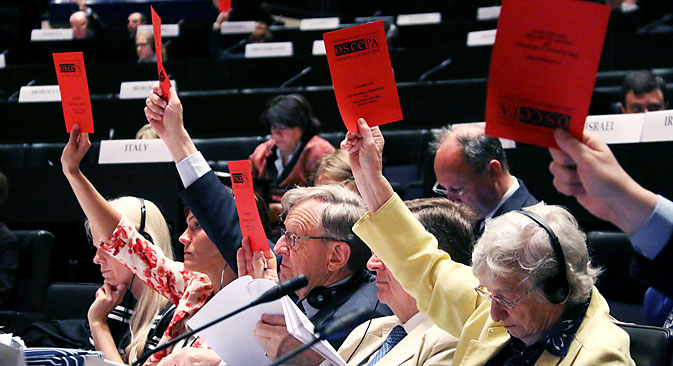
Russian business daily Kommersant describes the resolution, passed on July 8 at a session in Helsinki, as "unprecedentedly harsh". OSCE
The Parliamentary Assembly of the OSCE (Organization for Security and Cooperation in Europe) has adopted a resolution recognizing the presence of Russian armed forces in eastern Ukraine and condemning Russia for "acts of military aggression against Ukraine."
Russian business daily Kommersant describes the resolution, passed on July 8 at a session in Helsinki, as "unprecedentedly harsh" – until now the OSCE had not confirmed the presence of Russian forces in eastern Ukraine. This time, however, the assembly has not only announced the presence of Russian troops in the conflict zone, but also demanded that Russia stop "sending any type of aid to the illegal armed groups in Ukraine's Donetsk and Lugansk regions, including through the so-called humanitarian convoys."
Furthermore, the resolution mentions "the illegal occupation of Crimea," where the assembly believes the human rights situation is deteriorating sharply, and that due to "Russia's aggression" it is proving difficult for Ukraine to implement effective reforms.
The Russian delegation was not present during the last OSCE session, having opted to boycott it, and therefore was unable to influence the final resolution. Earlier, on July 1, Finland had denied Russian State Duma Speaker Sergei Naryshkin and other deputies entry into the country, citing the EU sanction lists. On the same day the Russian delegation decided to boycott the upcoming session in full.
Duma Deputy Nikolai Kovalyov warned that Moscow would consider all the assembly's decisions "illegitimate." "That is how we will treat the resolutions. They are juridically non-existent," said Kovalyov.
In the end, the resolution's final text, which had been prepared by deputies from the Ukrainian and Canadian delegations, was voted for by 96 members of the session. Seven delegates were against and 32 abstained. Due to the absence of the Russian delegation, certain deputies from France, Switzerland, Italy and Armenia refused to vote.
"Now, with our absence, the OSCE Parliamentary Assembly has succumbed to the temptation of carrying out these propaganda acts instead of doing concrete work," said Russian Foreign Minister Sergei Lavrov, commenting on the resolution.
"What is there to comment on, if we weren't there?" said Alexei Pushkov, Chairman of the State Duma Committee on International Affairs, in an interview with the Kommersant business newspaper. The newspaper writes that earlier, on several occasions, Pushkov had described the OSCE Parliamentary Assembly as the most constructive platform for dialogue between Russia and the West.
However, discussion between Russia and the West is still possible and the Parliamentary Assembly is still "the most constructive platform for dialogue," said Leonid Slutsky, chairman of the State Duma on CIS Affairs, Eurasian Integration and Links with Compatriots. He also remarked that the resolution's harsh rhetoric was "completely understandable in the absence of the Russian delegates."
Experts had also been expecting the resolution to be harsh. "It was prepared by Ukraine and Canada," explained Vyacheslav Igrunov, director of the International Institute of Humanitarian and Political Studies in Moscow.
"Ukraine's position is understandable, while Canada has found itself in a situation where the executive branch of the government is seeking support from Ukrainian-Canadian voters. This fall Canada will hold its parliamentary elections and in order to maintain the votes, recently it has been assuming a tough position in relation to Russia," he said, noting that if Russia had been present during the session, the resolution could have been mitigated.
“The U.S. and its satellites possess the control package of votes within the OSCE Parliamentary Assembly, that's all," said Timofei Bordachev, director of the Center for Integrated European and International Studies at the Higher School of Economics in Moscow.
"Besides the 28 EU countries, there is Turkey, Norway, Canada, the U.S. and Azerbaijan, which always, for reasons that are clear, supports any resolution that protects territorial integrity [a reference to the disputed territory of Nagorno-Karabakh, formerly part of Azerbaijan but now under Armenian control – RBTH]." Bordachev described the vote as a reaction to the fact that Russia did not make any concessions as a result of "OSCE's recent ultimatum-like demands."
However, to talk about the radical nature of the Parliamentary Assembly's resolution and compare it to previous announcements made by various OSCE structures is also incorrect, said Andrei Kortunov, general director of the Russian Council on International Affairs.
For example, the OSCE monitoring mission had never stated that Russian armed forces were present in Ukraine and OSCE Secretary General Lamberto Zannier said that it would be "difficult to prove" and he himself had "never seen them." "OSCE structures are all different," adds Kortunov. "The Parliamentary Assembly had always assumed a tougher position than the organization's other organs."
In Kortunov's opinion, the Parliamentary Assembly resolution should be perceived as nothing more than a political position, a signal possibly sent to Moscow, Kiev and those powers within the EU that oppose the dominant position in the OSCE body.
"Now the Americans will have yet another flag to wave. Apart from this, the resolution will have no consequences for Russia," said Kortunov.
Vyacheslav Igrunov pointed out that the Parliamentary Assembly cannot make decisions on sanctions. He does not believe that the passing of the resolution will bring any practical consequences such as concrete political measures or initiatives. "The only thing we should expect is an increase in anti-Russian propaganda," he said.
All rights reserved by Rossiyskaya Gazeta.
Subscribe
to our newsletter!
Get the week's best stories straight to your inbox